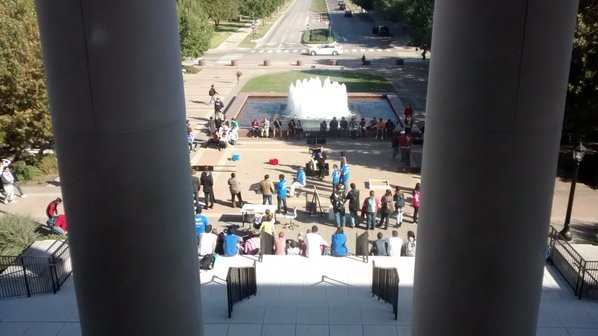Looks like a good day to be a @LyleEngineering student! #KNW2000 #robots pic.twitter.com/IeRcV7IXRN
— SMU-in-Taos (@SMUinTaos) November 20, 2015
By the time 2 p.m. came around, some teams had already been working in front of Blanton for over seven hours. Some had been there just 12 hours ago, performing last minute changes. And some, never left: pitching a hammock in between trees and trudging through the night.
However, shortly after 2 p.m., the first heat of competitors had placed their robots into the starting zone and waited for their showcase of a semester full of hard work and stress. Finally, they heard the words they had been waiting for, “And the match starts in 3…2…1…go!”
Over 96 Lyle School of Engineering students gathered outside of Blanton on the afternoon of Nov. 20 to present their robots that they had designed and programmed for Ways of Knowing: Introduction to Engineering Design.
After four different heats and a finalist round, The Les Beat team was awarded first place in the competition with a score of 112 in the final round, beating the second place team by 16 points. The team consisted AJ DeTorrice, Chris Stuchley, Jacob Hillman, Andrea Salt, Sean Burrows, Ian Johnson and Erin Walsh.
“At the very beginning, we were a highly functional group but terribly inefficient,” student Sean Burrows said. “We adjusted and adopted a really effective system.”
The overarching theme for the contest was that the students’ robots were supposed to be Mars rovers that had to complete several tasks on Mars. Participants were faced with several obstacles such as climbing a ramp, testing the wind speed and several others. For each task the robot completed, judges awarded the team points.
Four teams would compete in each eight minute round. Four rounds were completed before the finals. The top scoring team from each round, which were The Les Beat, Jazz Hands, GG Purple Cobras and Everything Bagel, advanced to the final round.
In addition to the numerous participants in attendance, nearly 50 staff members and other students cheered the engineers throughout the performance. Some students even brought signs to show support for their friends in the competition.
“We are super happy to support our friends for all of their hard work and those late nights in the innovation gym,” first-year Hanna Dodd said.
Students have been preparing for this showcase since the beginning of the semester. Each team was assigned a group of people and given some equipment such as a circuit board and some sensors, $30 to buy supplies if needed and a guidance sheet to aid them along the way. Teacher assistants who previously took the class assisted each group along the way as well. The students were then given the freedom to progress as their group deemed fit.
“The team divided into pairs and sub-teams which worked together on isolated functionality and then the whole team had weekly meetings to agglomerate everyone’s progress and update the robot,” first-year Ian Johnson said. “It was very much so a divide-and-conquer approach, but we nonetheless had some de-facto leadership which held it all together.”
Throughout the semester, students also faced smaller challenges against other teams as practice for the big event. The months, however, passed with many deadlines, stress and sleepless nights. Amidst all the hard work, team members would then still face the probability that the robot could still malfunction at the actual event despite all their preparation.
“The most stressful moment was when our entire robot stopped working an hour and a half before our third sprint was due,” first-year Andrea Salt said.
This Ways of Knowing course in particular is required for many Lyle engineering majors under the University Curriculum. Despite the fact that students cannot avoid the course, the final event did bring mixed reviews among participants.
“It was a thrilling experience to be on Mars, although I’m glad I won’t be traveling back,” first-year Robert Meszaros said.









